Vietnamese Calligraphy: A Symbol of Vietnamese Identity
Vietnamese calligraphy, known as “Thu Phap”, is a cherished art form that embodies Vietnam’s deep cultural and historical roots. With its elegant strokes and profound meanings, it transcends mere aesthetics, standing as a testament to the nation’s identity and values. This ancient craft reflects the essence of Vietnamese philosophy, harmony, and resilience, making it an integral part of the country’s heritage.
Let’s dive deeper into this beautiful art form, exploring its history, significance, and the efforts to keep it alive in the modern world!
1. Historical Background
The Origins of Vietnamese Calligraphy
Vietnamese calligraphy has its origins in the 1st century when Chinese characters, or chữ Hán, were introduced to Vietnam. These characters formed the basis of the country’s written language for centuries, and calligraphy became an esteemed skill among scholars and poets.


Influence of Chinese Calligraphy
As a neighboring country, China greatly influenced Vietnam’s early art and culture, especially calligraphy. Vietnamese scholars adopted Chinese methods but infused their unique flair. Over time, they developed “chu Nom“, a script specific to the Vietnamese language, marking the beginning of a distinct calligraphic tradition.
Evolution Across Dynasties
Calligraphy thrived during Vietnam’s dynastic periods, particularly under the Ly and Tran Dynasties. Scholars used it not only for artistic expression but also as a medium for preserving literature, history, and moral teachings.
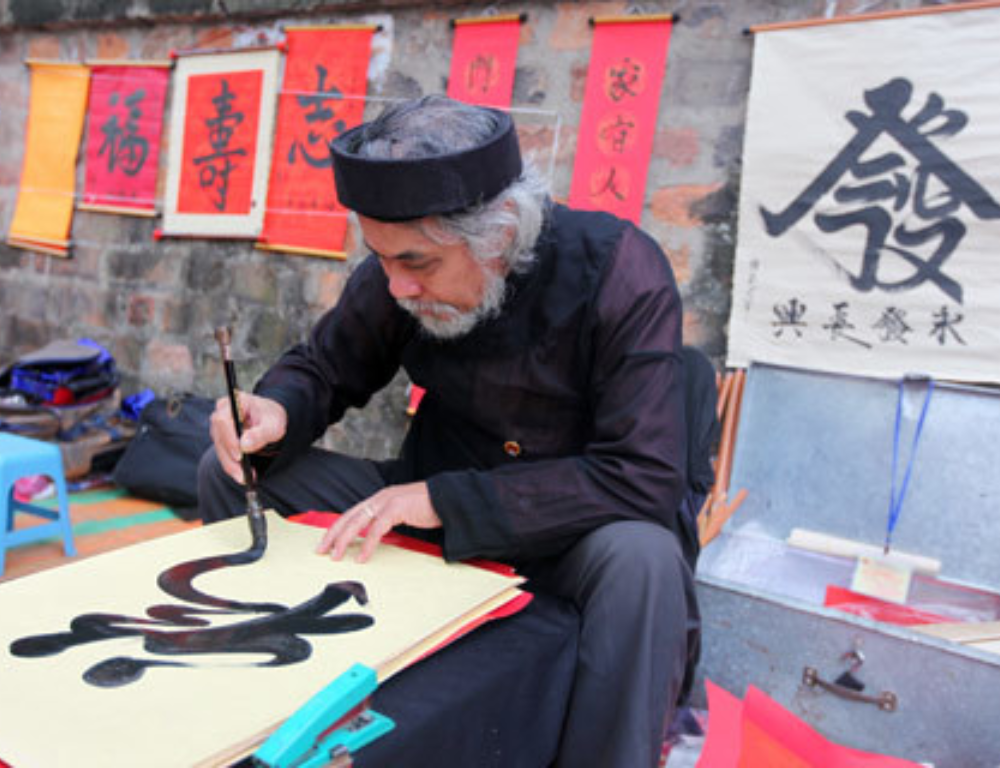

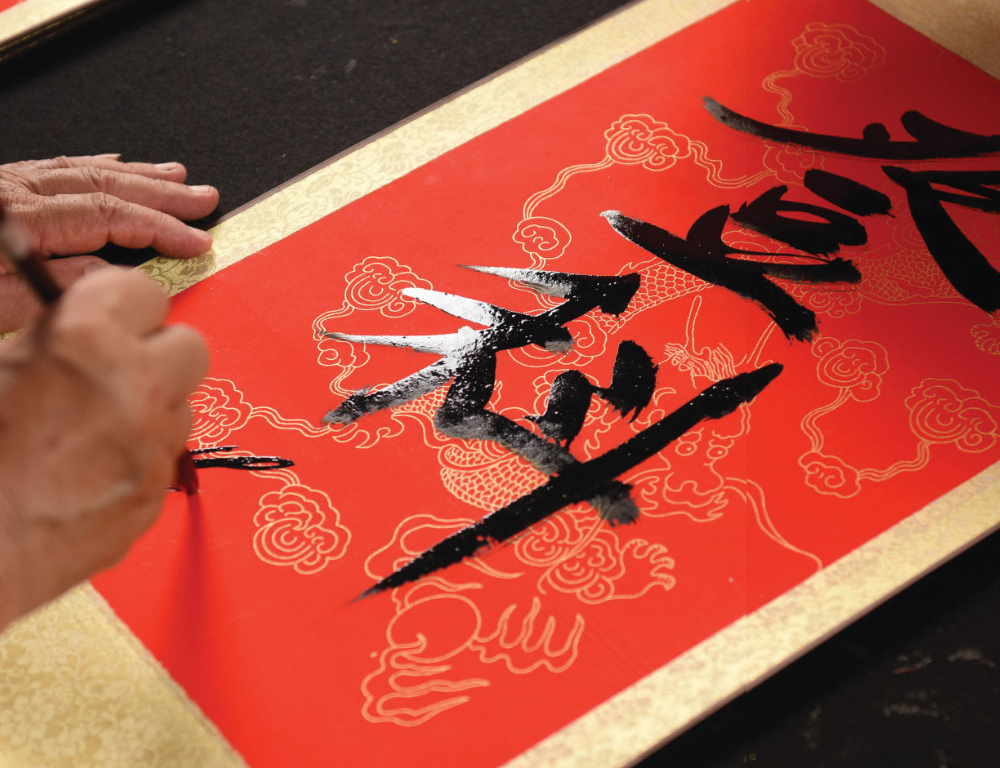

🇻🇳 Uncover the historical and cultural significance of Vietnamese Temples
2. Characteristics of Vietnamese Calligraphy
Distinctive Styles and Techniques
Vietnamese calligraphy combines balance and elegance. The strokes are fluid, often reflecting the writer’s emotions and thoughts. Unlike rigid forms, Vietnamese calligraphy emphasizes personal expression and individuality.
Traditional Tools and Materials
The tools for calligraphy are simple yet significant. Artists use bamboo brushes, black or colored ink, and rice paper. These materials connect the craft to Vietnam’s agricultural heritage, adding authenticity and charm.
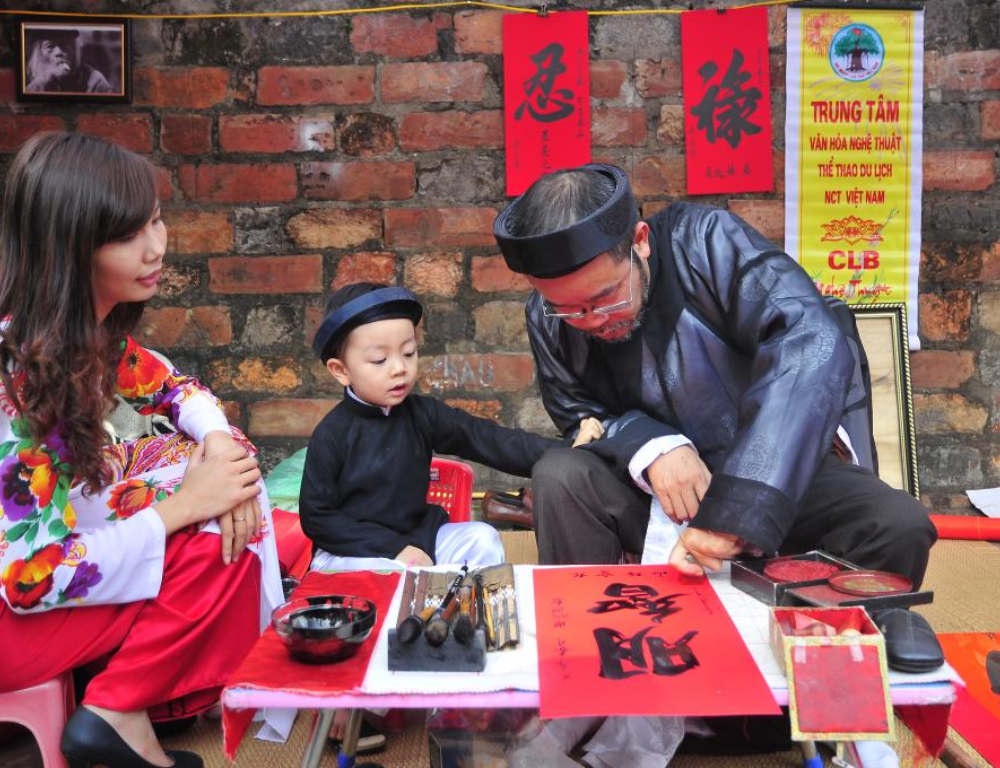

Proverbs and Poetry
One defining feature is the incorporation of Vietnamese proverbs and poems. These words of wisdom, rooted in Confucian and Buddhist teachings, often convey messages of humility, perseverance, and harmony.
🔥 Don’t know what to pack for your trip to Vietnam? Our comprehensive Vietnam Packing List has you covered!
3. The Role of Calligraphy in Vietnamese Society
Connection to Confucian Values
Vietnamese calligraphy aligns closely with Confucian ideals. Historically, it represented a scholar’s moral and intellectual refinement. Mastery of this art was a sign of wisdom and discipline.
Use in Literature and Education
In traditional education systems, calligraphy played a key role. Scholars meticulously practiced their writing to perfect not only their craft but also their character.
Cultural Significance During Tet
Calligraphy takes center stage during Tet Holiday, the Vietnamese Lunar New Year. Writing and gifting calligraphy during this time is a cherished custom, symbolizing blessings for a prosperous and happy year ahead.
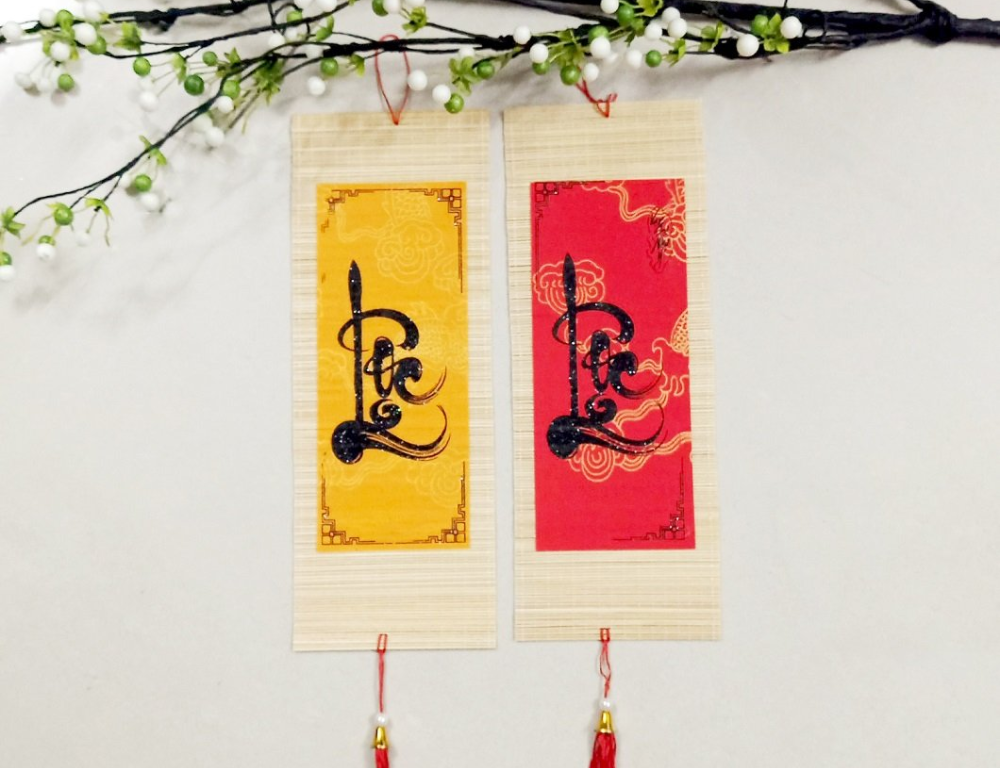

🔥 Wander through the charming streets of Hanoi French Quarter.
4. Calligraphy During Tet Festival
Traditional Customs
During Tet, calligraphy masters set up stalls in public spaces, offering handwritten pieces to visitors. These pieces are often displayed in homes to attract good fortune.
Popular Characters and Meanings
Characters like “Phuc” (happiness), “Loc” (wealth), and “Tho” (longevity) are highly sought after. Each stroke carries profound symbolism, connecting the recipient to centuries-old traditions.
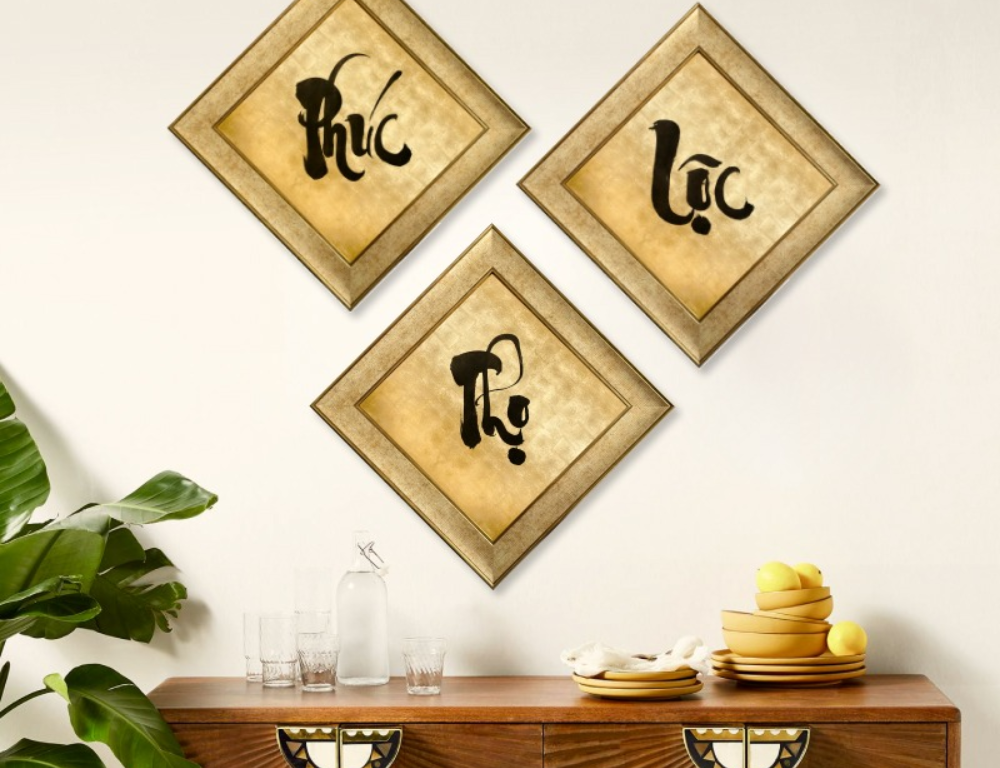

Symbolism in Prosperity and Happiness
Calligraphy during Tet goes beyond decoration. It serves as a spiritual gesture, expressing hopes for health, success, and harmony.
🔥 Want to experience the best experience in Hanoi? Click Hanoi Train Street for A Unique Blend of Old and New Journey.
5. Key Figures in Vietnamese Calligraphy
Throughout history, many calligraphy masters have contributed to the art form’s evolution. In modern times, artists like Le Xuan Hoa and Nguyen Van Khuyen have gained recognition for preserving and promoting traditional Vietnamese calligraphy.
📸 Immerse yourself in Vietnam’s captivating culture. From ancient temples to vibrant festivals, there’s something for everyone. | Contact us via WhatsApp or follow Sun Getaways Travel Fanpage for personalized trip planning. Or follow these posts to explore the cultural wonders of Vietnam:
6. Calligraphy as a Form of Art
Integration with Modern Art
Vietnamese calligraphy has evolved, blending seamlessly with contemporary art. Artists experiment with new materials, colors, and abstract concepts while staying true to traditional techniques.
Popularization Through Exhibitions
Exhibitions and cultural festivals have brought calligraphy to the forefront, allowing locals and tourists to appreciate its beauty and significance.
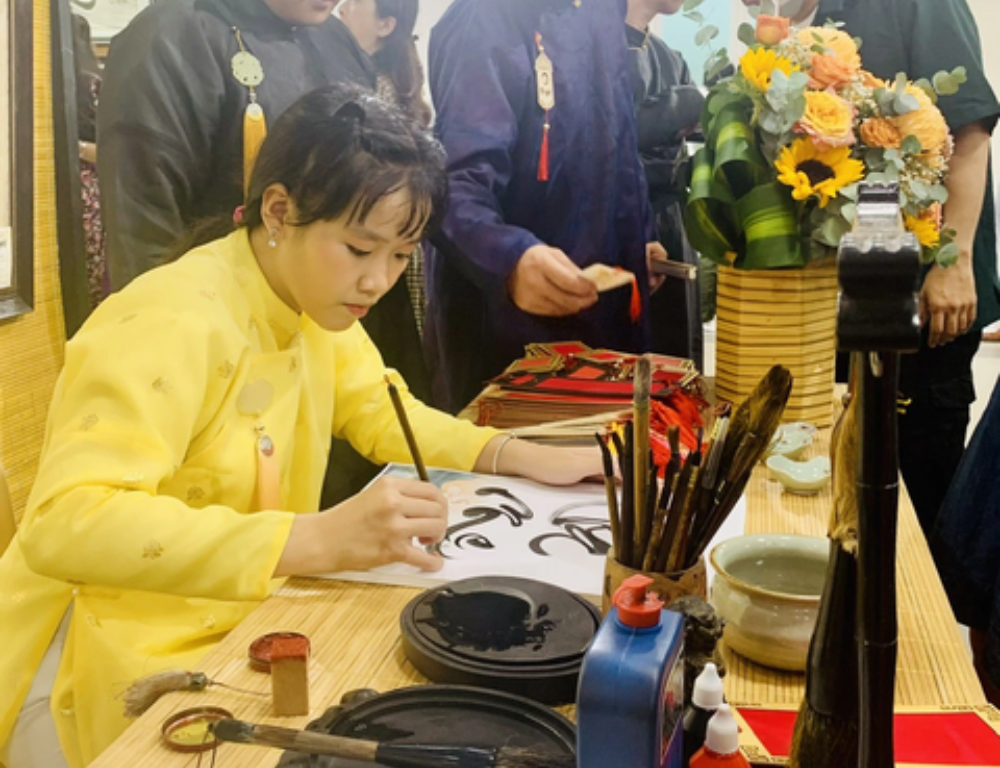

Emotions Through Strokes
Each calligraphic stroke represents more than words; it conveys the artist’s emotions and spiritual connection. This interplay of art and expression is what makes calligraphy timeless.
🔥 Discover the surprising truth about One Pillar Pagoda or understand local life with our Vietnamese culture travel guide
7. Challenges Facing Vietnamese Calligraphy
Decline in Traditional Knowledge
As modern education systems move away from classical scripts, fewer people learn traditional calligraphy. This shift poses a threat to the art’s survival.
Impact of Digitalization
In today’s digital age, typing has largely replaced handwriting, diminishing the demand for calligraphy. However, this also opens opportunities for reinvention.
Preservation Efforts
Many cultural institutions and NGOs are working tirelessly to preserve Vietnamese calligraphy. Workshops, competitions, and community programs aim to pass down this skill to future generations.
8. The Modern Renaissance of Vietnamese Calligraphy
Educational Programs and Workshops
Schools and organizations now offer calligraphy courses, introducing younger generations to the art form. These programs emphasize its cultural and historical significance.
Calligraphy in Branding and Design
Vietnamese calligraphy has found a new audience in the branding world. Its unique style adds an authentic and cultural touch to logos, packaging, and advertisements.
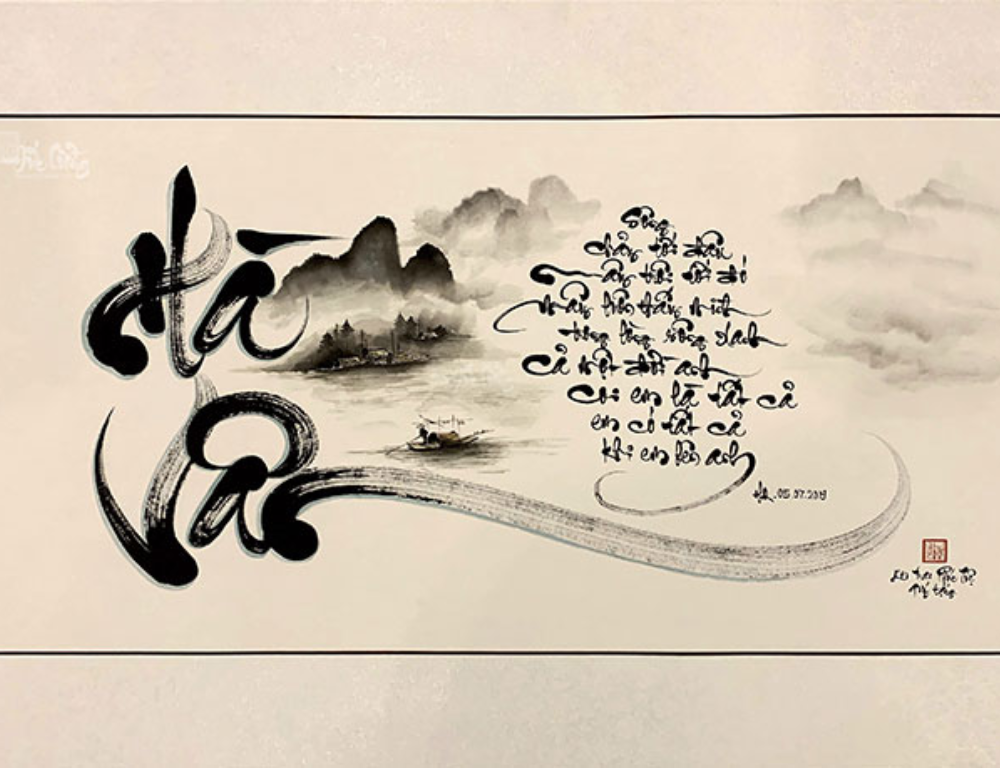

Youth Engagement
Younger artists are redefining calligraphy, merging tradition with innovation. Social media platforms have also become a hub for sharing and promoting their works.
🔥 Want to learn more about Hanoi street food? Click here to read our in-depth guide.
9. Calligraphy and Tourism
Vietnamese calligraphy appeals to international visitors as a unique souvenir. Tourists often admire the intricate strokes and meaningful characters, taking home pieces of art that symbolize Vietnamese culture.
10. Vietnamese Calligraphy in the Digital Age
Virtual Tools and Apps
Digital tools now allow people to practice calligraphy virtually. While this introduces the art to a wider audience, it raises questions about authenticity and tradition.
Balancing Tradition and Technology
The challenge lies in maintaining the integrity of traditional calligraphy while embracing modern advancements. Many artists strive to strike this balance, ensuring the art remains relevant.
11. Symbolism in Vietnamese Calligraphy
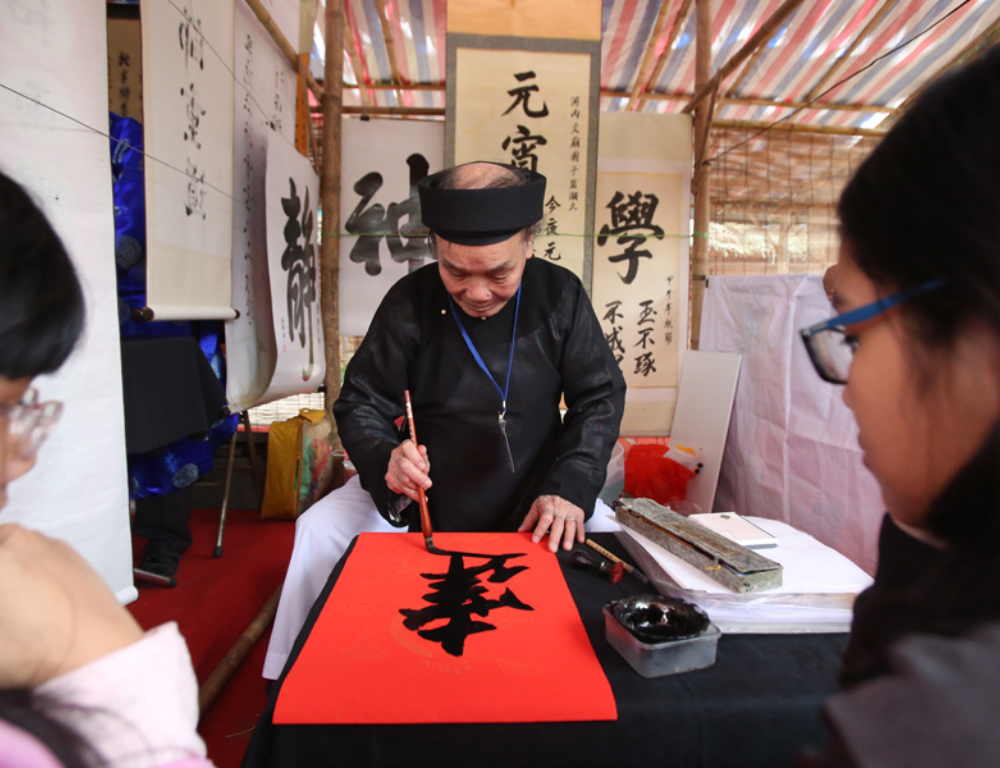
At its core, Vietnamese calligraphy is more than just writing. It represents values like resilience, harmony, and spirituality. Each piece tells a story, connecting the artist and viewer to Vietnam’s rich heritage.
🔥 Immerse yourself in the city’s Oldest and Most Beautiful Temple: Tran Quoc Pagoda Hanoi
12. FAQs
- What makes Vietnamese calligraphy unique?
Vietnamese calligraphy emphasizes balance, individuality, and cultural expressions through poetic verses and proverbs. - Why is calligraphy significant in Vietnamese culture?
It reflects the nation’s values, history, and artistic spirit while preserving its philosophical and literary heritage. - Can beginners learn Vietnamese calligraphy?
Yes! Many workshops and online tutorials are available for both locals and international enthusiasts. - What role does calligraphy play during Tet?
During Tết, calligraphy is used to wish prosperity, happiness, and good fortune for the new year. - How does modern technology impact Vietnamese calligraphy?
Technology introduces new audiences to calligraphy but challenges traditional practices, necessitating a balance between old and new.
13. Conclusion
Vietnamese calligraphy stands as a profound symbol of the nation’s cultural and historical identity. Despite challenges, it continues to inspire and connect people across generations. Whether through traditional strokes or modern adaptations, calligraphy remains an enduring art form that deserves appreciation and preservation.
Experience Vietnam like never before with Sun Getaways Travel. Our all-inclusive trips cover every detail, from accommodations and transportation to unforgettable experiences, depending on your interests (Our Customized Private Tour for each customer to Vietnam 🇻🇳). Ready to embark on your next adventure?
Ask a question
Leave a Comment (0)
No questions yet. Be the first to ask a question!




















